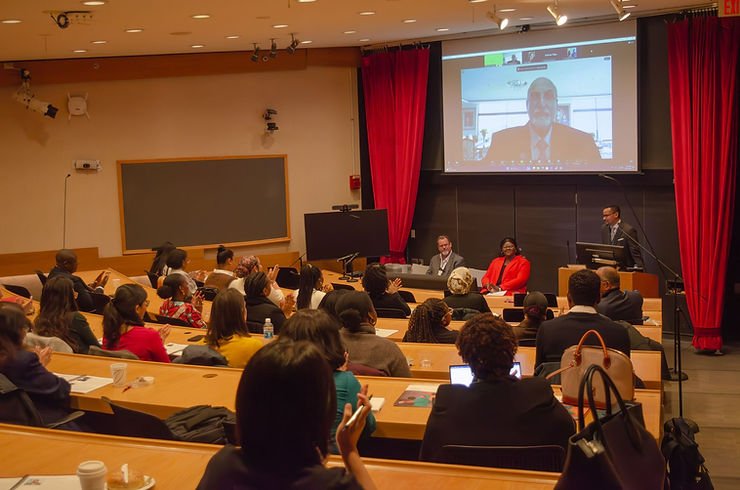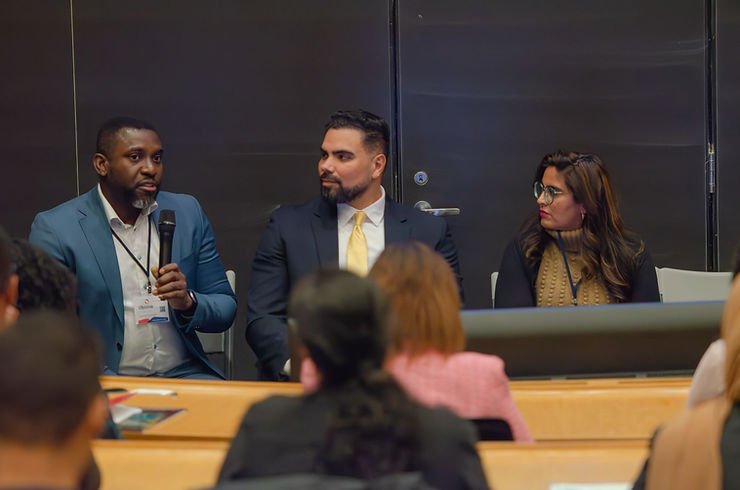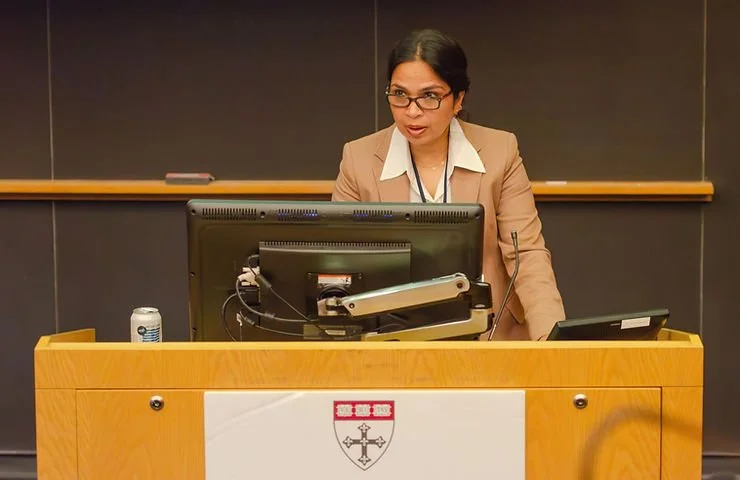Mapping Changemakers in Health in Africa: The Conference Experience
Photo of 4 Black women smiling on the first day of the Africa Health Conference. Left to right: Ola, Jonta, Umu-Hawa, Astrid.
This post is in collaboration with the Harvard Chan Africa Health Students Forum. Thank you to the team for sharing the conference photos with me.
The Harvard Chan Africa Health Students Forum hosted an inspiring and thought-provoking conference from February 23 to 24, 2024. The conference brought together 232 in-person attendees and 300 online attendees, representing 33 countries. If you read my last post, you know that the conference theme was “Mapping Changemakers Transforming Health in Africa.” And if you have not read it yet, make sure to check it out. The theme centered on change that is happening while also recognizing that there is more that still needs to be done. It was refreshing to be in a space with this positive outlook on public health in Africa and surrounded by great people all doing exceptional work to advance public health on the continent.
Conference Day 1
Conference attendees at the African Women Luncheon.
The conference started on Friday, February 23, 2024, with the Harvard Africa Women Luncheon. I arrived in Boston early in the morning so I attended the inaugural luncheon titled “Breaking Barriers, Building Bridges: African Women Leading Change.” This session brought together African women (and African women in the diaspora including those in the Caribbean!) in a setting to discuss our careers and build our network over lunch. I had the honor of sitting at a table with the Minister of Health of South Sudan H.E. Yolanda Awel Deng and Dr. Ellen Mkondya-Senkoro, the CEO of Benjamin W. Mkapa Foundation. These women shared their experiences navigating the public health field while also giving us a space to share our experiences.
This was a great space to be in to hear from powerful African women leading change. My key takeaways from this session were the following:
Advocate for yourself and take breaks
Go back to the continent so you do not lose touch and get too comfortable
Remember who you are versus whose you are
If you are in the Boston area, make sure to check out future events with Harvard’s African Women Leaders (AWL).
The evening finished with poster presentations, networking sessions, and a fireside chat with the Minister of Health of South Sudan. Some of the themes of the posters were digital health, digitizing paper-based records, violence in youth, and mental health policies.
Advocate for yourself and take breaks
Conference Day 2: Morning Sessions
Photo of the Africa Health Conference 2024 co-chairs from left to right. The conference team consists of Valencia Lambert, Tatenda Mujeni, Sabrina Ebengho, Anja Riester, and Teguo Djoyum.
The second day of the conference commenced with opening remarks by the conference team. The team ensured audience engagement by asking where participants came from and what health in Africa means to us. Some words that stood out to me were “equity,” “resourcefulness,” “innovation,” and “progress.” We recognize that there are challenges but it is also about sustaining progress and ensuring equitable access to health services.
The first plenary sessions were next. The sessions were on Health Priorities: Addressing the Double Disease Burden in Africa and Drugs & Vaccines: Strengthening local supply chains, manufacturing, and innovation. I attended the local supply chain manufacturing session. Stay tuned for a blog post with a summary of the drugs and vaccines session.
The Health priorities session included Dr. Salim S. Abdool Karim, a South African clinical infectious diseases epidemiologist; Dr. Julie Makani, a Physician Scientist in the Department of Haematology and Blood Transfusion at Muhimbili University of Health and Allied Sciences (MUHAS) and Provost Visiting Professor at Imperial College London; Dr. Dereje Duguma Gemeda, a State Minister in the Federal Democratic Republic of Ethiopia; Dr. Kalé Kponee-Shovein is an epidemiologist and environmental health scientist at Analysis Group; and Trad Hatton, PATH’s country director for the Democratic Republic of the Congo. This panel was moderated by Dr. Hailu Dhufera, a student at Harvard’s School of Public Health.
The second plenary sessions followed. The sessions were on Digital & AI: The Power of New Technology in Africa and Health Startups Made in Africa: How can entrepreneurs fill in Public Health Gaps. They focused on how technology is being used to transform health in Africa. I attended the session on health start-ups so stay tuned for a post about that session.
The session on Digital & AI had fellows and individuals working in the AI space. This session included Dr. Kristina Wallengren the Global CEO of THINK, Ilai Soloducho from Google Labs working on generative AI capabilities to change software engineering, Dr. Sachita Shah the Sr. Director of Global Health and lead for Womens Health at Butterfly Network. The fellows at this session were Dr. Chinasa T. Okolo, Ph.D., a Fellow at The Brookings Institution and Khahlil Louisy (he/him), a Senior Data-Smart Fellow at the Data-Smart City Solutions program at the Bloomberg Center for Cities at Harvard University. This panel was moderated by Ngasuma Kanyeka, a student at Harvard’s School of Public Health.
We recognize that there are challenges but it is also about sustaining progress and ensuring equitable access to health services.
Conference Day 2: Afternoon Sessions
Panel on Women in Health. From left to right: Dr. Emmanuella Amoako, H.E. Yolanda Awel Deng, Rebeca Gyumi, and moderator Dr. Olayinka Fakorede. Dr. Meseret Zelalem Tadesse is not pictured as is on a Zoom screen.
The afternoon started with the third plenary session. This session was titled Women in Health: Strengthening Leadership and Inclusion. There was only one session to attend at this time, highlighting the importance of including women in public health. Having only one session, at this time reiterated the importance of this session as it encouraged everyone to attend it. Women make up 70% of the healthcare workforce but are in very few leadership positions. African women are underrepresented and it is vital to empower African women to achieve health equity. Last year I wrote about gender inequity in public health and you can read the post here. Below is a quotation from last year’s conference that is still relevant this year (and will probably be for years to come).
"How do we shift power in public health and ensure that African women partake in agenda-setting?" - Fatou Wurie
This session featured the Minister of Health of South Sudan H.E. Yolanda Awel Deng. The second panelist was Rebeca Gyumi a Tanzanian girls’ rights activist, lawyer, and the Founder and Executive Director of the Msichana Initiative which promotes girls’ access to education and empowerment. The third panelist was Dr. Meseret Zelalem Tadesse the Lead Executive of Maternal, Child and Adolescent Health, programs at the Federal Ministry of Health of Ethiopia. The fourth panelist was Dr. Emmanuella Amoako, a Paediatric Oncology Fellow at the Korle Bu Teaching Hospital, lead of clinical research projects at Yemaachi Biotech, and co-host of the Global Health Unfiltered Podcast. This panel was moderated by Dr. Olayinka Fakorede, a student at Harvard’s School of Public Health.
Classroom for Lessons Learned: Safeguarding Africa’s health security and preparing for the next pandemic.
The fourth plenary sessions followed. The sessions were on Health Financing: Supporting Africa’s Health Priorities for the Next Decade and Lessons Learned: Safeguarding Africa’s Health Security and Preparing for the Next Pandemic. The session on Safeguarding Africa’s Health Security featured Dr. Degefa Uma Banti from the Ethiopian Pharmaceutical Supply Service (EPSS), Dr. Ellen Mkondya-Senkoro who I met at the AWL luncheon and the Chief Executive Officer of the Benjamin William Mkapa Foundation, Professor Adam Kamradt-Scott the Dr. Jiang Yanyong Visiting Professor of Global Health Security at the Harvard T.H. Chan School of Public Health, and Dr. Bélizaire who is running the Harvard LEAD Fellowship 2023-2024 cohort. This panel was moderated by Temiwunmi Akinmuleya, a student at Harvard’s School of Public Health.
During this plenary session, I attended the health financing session. The session included Dr. Obinna Onyekwena from the Bill and Melinda Gates Foundation, Dr. Moustafa Abdalla from the World Bank, Nafisa Jiwani from U.S. International Development Finance Corporation (DFC), and Sydney Hushie from the United Nations Population Fund (UNFPA). This panel was moderated by Tatenda Mujeni, a student at Harvard’s School of Public Health.
In this session, Dr. Moustafa mentioned the need to think differently about how to finance our health systems while also recognizing that this will look different in every country. This is especially true for pooling domestic funding as increased taxation has worked well in some countries but not as great in others while some countries pool funds from communities and pay for services based on performance.
Another topic that was discussed, is the importance for governments to ensure there is coordination, especially in largely donor-financed projects as donors tend to have different requirements for each program. An example presented was that in 2008, Rwanda asked for specific funding for specific programming, and resource-based financing models where there are resource gaps. This ensures that donors are directly supporting a gap presented by the Ministry of Health in Rwanda. Could this be a model for other countries to follow?
We need to think differently about how to finance our health systems - Dr. Moustafa Abdalla
3 panelists from the health financing session. From left to right: Dr. Obinna Onyekwena, Dr. Moustafa Abdalla, and Nafisa Jiwani.
While this session brought together development partners and the private sector, it was rightly mentioned that this session was missing individuals from the government. Possibly, a future approach might be regional, as each region of the continent is vastly different when it comes to health financing. Governments could be invited to discuss their country in a region.
Conference Day 2: Closing Remarks
To close off the conference, Professor Padmashree Gehl Sampath, the Chief Executive Officer of the African Pharmaceutical Technology Fund (APTF) and a professor at Harvard’s Berkman Klein Center gave the closing remarks. She reminded us of the changemakers on the African continent, institutions such as the Africa CDC, African Medicines Agency (AMA), African Development Bank (AfDB) which set up the APTF, and the Africa Continental Free Trade Area (AfCFTA) Secretariat which has launched an intellectual property (IP) protocol for the continent. As of January 2023, 54/55 African Union Member States have signed the AfCFTA. These institutions have transformed the way we look at public health in Africa as the continent needs to and will produce its own medicines and increase access.
Closing remarks by Professor Padmashree Gehl Sampath.
The second key message from these remarks was that during the COVID-19 pandemic, the African continent paid the price for having weak institutions and a public health agenda that was decided externally. The continent needs a public health philosophy that is grounded in self-reliance, and technology has a role to play in the distribution and supply of medical products, as well as in keeping health records. This will be through innovations in technology and how we work together within and across our regions.
The third key message was that we need to think about new ways of building bridges. We must remember what worked in the past, especially indigenous knowledge, and how to integrate it. We must also build bridges with the current changemakers on the continent empower them and find ways to work together and amplify their work.
The fourth key message from Professor Padashree was to consider changing the narrative of public health in Africa – “don’t end the debate before your point is heard.” We all have a role to play in changing the narrative so we must start and continue these conversations. There are a lot of changemakers and we must showcase their work and empower them.
Photo of Jonta (left) and Prof. Padmashree (right) smiling
"don’t end the debate before your point is heard.” - Professor Padmashree Gehl Sampath
The organizing team of the conference also mentioned the importance of working with allies. As we work towards change it is important to work with allies and build bridges and equitable partnerships. These equitable partnerships should recognize that everyone should be respected as we all bring unique experiences and expertise. Teguo Djoyum, the Conference Treasurer, reminded us that consistency is key to the success of all our efforts.
As the conference is over, and we have all returned to our respective places, it is important to reflect on the work we are doing and the conversations we are having to change the narrative of public health in Africa.
If you did not attend, I hope this post enlightened you about the discussions at the conference, and you can join Harvard’s 3rd Annual Health Conference!







